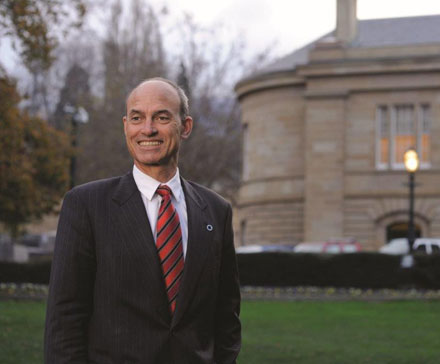
Guy Barnett
Tensions between Tasmania’s long-held identity as a logging state and its emerging brand as an ecotourism destination are being put to the test in Derby. Source: ABC News
The small north-east Tasmanian town is caught in a political fight over legislation that could open parts of its world-renowned mountain bike trail to logging.
In recent years, Derby and the surrounding region have suffered from a decline in traditional industries like mining and forestry.
“I’ve seen it go up and down a couple of times,” says local Ronny Hayes, who has lived in the town for over 70 years. “Mining towns when they cease mining just sort of die.”
But Derby has been given a new lease on life by a multi-million-dollar investment in a series of mountain bike trails stretching through 85 kilometres of pristine wilderness.
Mr Hayes, who is commonly regarded as the “Grandfather of Derby”, says the Blue Derby trails are the best thing to have happened to the town since they found tin in the 1800s.
“It will mean the town will never die now,” he says.
Despite the State Government’s support of the tourism venture, it is intent on passing legislation that would unlock 365,000 hectares of forest around Tasmania for logging, including a section of the Blue Derby trails.
The legislation failed to pass the Upper House in June, but Resources Minister Guy Barnett says the Tasmanian Liberals will seek a fresh mandate at the next state election.
“We’ll have that election in March [2018] when it is due and put forward the legislation again,” he says.
But Dorset Council, the main driving force behind the mountain bike development, is convinced the legislation will have no impact on the Blue Derby trails.
Mayor Greg Howard says the forest around Derby is commercially unviable and even if unlocked, it won’t be logged.
“The trail network is under absolutely no risk whatsoever from harvesting,” he says. “Unless the price of woodchips and sawn timber goes through the roof by 300% to 400%.”
While the council maintains the legislation won’t impact the Blue Derby trails, local business owners like Christine Booth are not convinced.
Christine Booth says she can’t understand why the Government is so determined to pursue the legislation, when they’ve so clearly prioritised the tourism industry.
“I’m totally gobsmacked that the State Government is even proposing to do this,” she says. “I can’t believe they would do anything that would jeopardise the economic development of this region given that tourism is an expanding industry for us here.”
For some locals the transition to a tourism-based economy hasn’t been easy. Many residents, including local Peter Coxhead, complain a lack of community consultation has led to tensions.
“Derby had the mountain bikes foisted upon them,” he says. “The council didn’t come to Derby and say: ‘Would you like to be the centre of mountain biking in Australia?’ Because I can tell you, the people would have said no if they’d done that.”
Mr Coxhead says adapting to tourism hasn’t been easy for many long-established business owners.
“They’ve got no idea what these yuppies on mountain bikes require,” he says. “They don’t know a macchiato from a Nescafe cup of coffee.”
Stuart Rainbow runs the Dorset Hotel with his partner Leonie Smithurst, who has owned the establishment for 26 years.
He says many locals have sold out and left since the mountain bikers arrived, and he fears the town has lost its culture.
“I’m concerned about the loss of a town and I believe Derby’s lost its town,” he says.
As tourism expands in the region, new businesses continue to emerge. But local shuttle bus owner Damian von Samorzewski says many of those businesses are coming in from out of town.
“A lot of the businesses now all actually employ blow-ins from either Launceston or out of the state even,” he says. “There’s definitely potential for growth for local employment. I guess the trick is to develop the appropriate skill set to be employable.”
Mark Cornish is one those blow-ins. He moved to Derby for the mountain biking, and says he feels like the town is at a turning point.
“We feel like now is a really good time to get into it and see the mountain biking and Derby bloom,” he says.
Like Tasmania more broadly, Derby has morphed and altered into a different kind of town — one where forestry and ecotourism need to co-exist peacefully together to survive. Its fate now rests on how it negotiates the balance between old and new.







